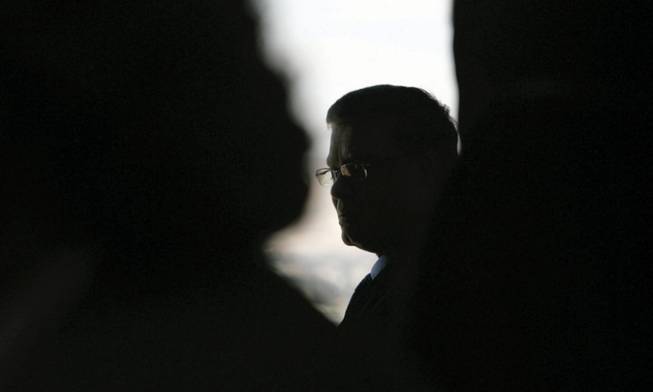
Dr. Dipak Desai is majority owner of the endoscopy clinic where at least six people contracted hepatitis C.
Thursday, March 6, 2008 | 2 a.m.
Sun Topics
We may never know how many patients contracted infectious diseases at a clinic where unsafe injections were the cause of the largest hepatitis C scare in the nation.
The reason: About 2 percent of the U.S. population and an estimated 4 percent of patients at the clinic — whether they know it or not — already carry the hepatitis C virus, according to health officials. The estimate is higher for patients at the clinic because it serves an older clientele.
Thus, if 40,000 people were put at risk of hepatitis B and C and HIV by unsafe injection practices at the Endoscopy Center of Southern Nevada, as the Southern Nevada Health District estimates, and all of them get tested, the math suggests 1,600 of them might test positive for hepatitis C.
Most of them would not have known they were carrying hepatitis C until being tested, because in four of five cases symptoms — such as loss of appetite, nausea and jaundice — don’t appear.
And upon learning now that they have the virus, they won’t know whether they contracted it during the procedure at the Endoscopy Center of Southern Nevada or through some other way — before or after their procedure.
Hepatitis C typically is contracted by intravenous drug users, dialysis patients or people who received blood transfusions or organ transplants before 1992, when blood and organs were not screened carefully for the disease.
(It’s highly unlikely that hepatitis B or HIV was passed on at the clinic, health officials say, but they are encouraging the testing to make certain.)
As a result, any litigation by hepatitis C carriers against the endoscopy clinic will be muddied because of the difficulty in proving they contracted the disease there.
Assumptions can’t be made that the Health District will undertake the expensive and specialized genetic testing to show hepatitis C links to the clinic, said Brian Labus, the district’s senior epidemiologist.
The genetic testing that linked six patients with hepatitis C to the clinic was conducted by the Centers for Disease Control and Prevention. “They will do it for investigations,” Labus said. “They won’t do it for lawsuits.”
The Health District’s mission is to identify public health threats, take action to see they’re stopped and communicate to the public, Labus said. In this case, the mission was to find out what happened on July 25 and Sept. 21, the days six people were infected with hepatitis C at the endoscopy center. The district has accomplished that.
Further investigation will be undertaken only if other clusters of hepatitis C cases pop up, he said, or if something else noteworthy comes from the community testing.
The Health District announced the public health crisis after the CDC concluded genetic tests in five of the six known acute hepatitis C cases — the cases in which the patients were showing symptoms. This involved isolating the genetic material — in this case RNA — in each strain of the virus to determine its exact sequence. It’s like identifying a bar code for each virus, an identifier that can be used for the sake of comparison with other viruses, Labus said.
The genetic breakdowns have been completed on the virus from the patient who went to the endoscopy clinic on July 25 and on four of the five who visited the clinic Sept. 21. Hepatitis C viruses are known to mutate and their genetic sequences vary greatly, Labus said. But the four viruses from the Sept. 21 cases match up. Two of them were “100 percent identical and the other two were similar enough, based on what we know about hepatitis C, to say they all came from the same source,” Labus said.
Some attorneys who are suing the Endoscopy Center of Southern Nevada have said that patients, before they join a class action lawsuit, will have to be tested to identify the genetic sequence of their hepatitis C virus. Labus said patients can always look into getting the genetic breakdowns done, but that it’s not the type of testing that’s available to the public in any place he knows.
“I don’t know that it’s ever been done outside the investigative work for public health,” Labus said.
Sun reporter Mary Manning contributed to this story.

Join the Discussion:
Check this out for a full explanation of our conversion to the LiveFyre commenting system and instructions on how to sign up for an account.
Full comments policy